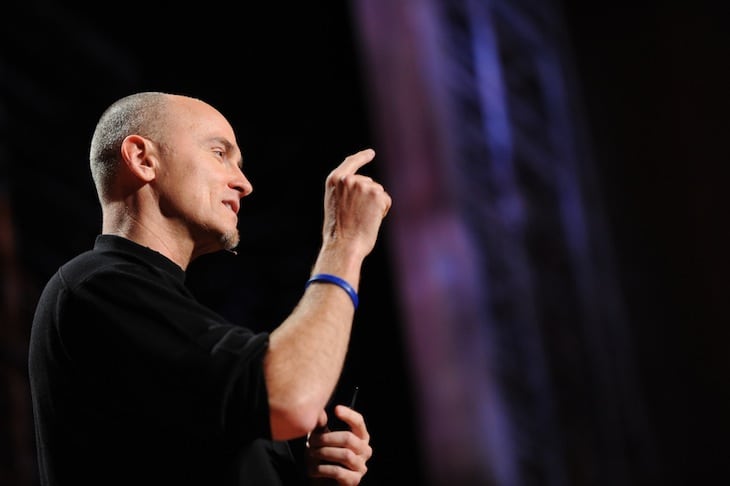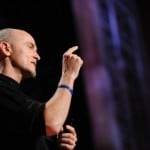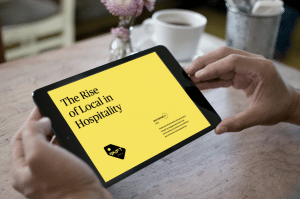Skift Take
Ex-hotelier Chip Conley is attempting to bring uniform standards of hospitality to the Wild West of online property sharing and half a million micro-entrepreneurs worldwide.
- Chip Conley, Head of Global Hospitality, Airbnb
- Airbnb, poster child of the sharing economy
In 1987, Chip Conley launched Joie de Vivre Hotels when he was just 26 years old, beginning with the Phoenix Hotel in San Francisco. The retro motorlodge helped launch the boutique hotel industry in America. In 2010, he sold his shares in the company to Hyatt Hotels heir John Pritzker. This year, Conley was appointed Head of Global Hospitality for the property-sharing online portal Airbnb, which presently has over 500,000 listings in 35,000 cities in 192 countries.
Conley gave the keynote speech last month at the Travel Blogger Exchange (TBEX) conference in Dublin. He didn’t have much to say about travel blogging, but he did provide an illuminating glimpse into the migration of hospitality over the last three decades.
The first half of Conley’s talk focused on how he created an overarching theme for each of his 52 Joie de Vivre hotels by aligning them with a specific magazine. The vibe and vision of whatever particular publication he chose directed the vibe and vision of the property.
For his inaugural Phoenix Hotel in San Francisco’s gritty Tenderloin, Conley chose Rolling Stone.
“Hotels and magazines have something in common, they’re both very niche oriented and very lifestyle oriented,” he said. “So this first hotel was based on Rolling Stone magazine, and we came up with five adjectives: funky, irreverent, adventurous, cool and young at heart.”
From there, everything that went into the creation of the hotel, from staff hiring to guest room design, expressed a rebellious, rock ‘n roll, subcultural enthusiasm.
“What we learned quite quickly though was that the people who fell in love with the hotel saw the hotel as almost a reflection of themselves,” Conley explained. “They saw themselves, by staying in the hotel, they thought of themselves as funky, irreverent, adventurous, cool and young at heart.”
More About Airbnb:
- Expedia CEO Is Bullish About the Future of Airbnb
- Airbnb’s CTO on the Battle for New York and IPO Rumours
- Airbnb Vs. New York City: The Defining Fight of the Sharing Economy
For guests attracted to the Phoenix, the hotel became “almost a mirror of their aspirational self.”
Not everyone liked the Phoenix or the neighborhood, however, especially Conley’s mom. So for his second project, he opened Hotel Rex in San Francisco’s more posh Union Square, this time based on The New Yorker.
“What I started to learn was that each time we created a hotel, if we created a personality that defined the hotel, and it was a very soulful, holistic personality, we found that people fell in love with the hotel,” said Conley. “Then they shared that love with their friends…. We grew into a $250 million a year company and we spent less than $50,000 a year in advertising.”
The ex-hotelier is a big fan of Maslow’s hierarchy of needs pyramid, which he showed in various iterations to support a variety of themes during his talk. He said that hotels can be broken down into a 3-level hierarchy of purpose. There’s the utilitarian hotel at the bottom that satisfies our needs for convenience, comfort and security. Above that, certain hotels cater to our physical and emotional desires. At the top of the pyramid, there are those hotels, or any consumer brands for that matter, that deliver on unrecognized needs. They offer us something we didn’t know we wanted.
Brands that act as mirrors to our aspirational selves exist at the top of the pyramid.
“When you meet the unrecognized needs of your guests that they weren’t even thinking of,” said Conley, “you end up creating a customer who is evangelical and probably will be incredibly loyal to you.”
After selling his shares to Pritzker, Conley traveled, wrote a couple books and kept his eyes open for new pursuits.
“So I started watching this weird little company,” he laughed. “Airbnb. Who the hell are they? What a terrible name for a company. Why did they come up with that name?! Right?”
As he learned more, Conley started to relate to the startup because, he says, “They have become the disruptive innovator just like boutique hotels were, but in a much bigger way.”
As the story goes, Airbnb was originally called “Airbed & Breakfast” by a couple of San Francisco guys in their 20s who couldn’t afford their rent. So they rented out air mattresses and floor space to a few visitors in town for a design conference who couldn’t find an affordable hotel room. The rest is history.
“Airbnb started out as just a little idea, this idea of opening your doors and opening your home to someone from another place to come stay with you,” said Conley. “In fact, 70% of people who stay at an Airbnb listing are from a foreign country…. There’s a lot of people out there who want to go stay and have a localized experience.”
To what does he attribute the meteoric growth of the company?
“What is interesting is that they met an unrecognized need. The number one core value of Airbnb is how to be a host… They’re in the business of teaching the generosity and spirit of hospitality to hundreds of thousands of micro-entrepreneurs in almost 200 countries in the world.”
Moving forward, Conley is implementing new brand standards and guidelines to help hosts improve the overall Airbnb experience.
Following that, Conley wants to curate the online user experience by providing more customized search options based on the individual user’s profile. This is especially important in Airbnb’s largest markets. For example, there are over 20,000 listings for Paris, making it increasingly time consuming to cull down through so many options.
“You’ll be able to personalize selections based on what kinds of interests you have,” summed up Conley. “And also, here’s 10 things to do in Paris that fit your identity and personality, and no one else’s. Wouldn’t it be nice if a hospitality company did that? Marriott doesn’t do it, and Hilton doesn’t do it. We will be doing it.”
During the Q&A session afterwards, numerous bloggers said the keynote was moving, inspirational, motivational—transcendent, even. That’s the beauty of Conley. He has a boatload of charisma, vitality and that West Coast, yoga-loving, 100% natural orange juice demeanor.
“I see him as a hippie for the new millennium, driven by profit, of course, but also a quest for stimulation, joy and meaning,” said Julie Mautner, publisher of the popular travel blog ProvencePost.com in the south of France. Mautner represents the new breed of “entrepreneurial journalists.” She uses her blog to promote customized travel programs that she’s developed based on her extensive knowledge of Provence.
Mautner said after the keynote, “Chip’s conviction that satisfying these higher needs is the key to success in just about any business is a great message for travel bloggers. If you give your readers what they want and need, but amuse and stimulate them on multiple levels too, you’ll succeed.”
Conley’s engaging personality and lofty philosophical ideals in both life and hospitality have served him well in business. But can he impart that spirit to half a million Airbnb hosts worldwide?
Greg Oates covers hospitality trends and next generation hotels. He has participated in 1,000+ hotel site inspections in over 50 countries.
Dwell Newsletter
Get breaking news, analysis and data from the week’s most important stories about short-term rentals, vacation rentals, housing, and real estate.
Have a confidential tip for Skift? Get in touch
Tags: airbnb
Photo credit: Chip Conley, Head of Global Hospitality, Airbnb Chip Conley



